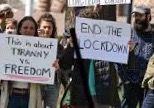Our attachment to being right
‘The most destructive element in human relationships is the urge to make other people bad or wrong, and then judge, reject or punish them for that.’ - John Welwood
The controversy over how different countries have responded to the coronavirus challenge has brought up yet again the danger of assuming that our own opinion or outlook is somehow correct and ‘good’ and that other opinions are obviously wrong and, in some cases, ‘bad’ or ‘wicked’.
This is a tendency I recognise in myself. Sometimes it just seems so obvious that what I believe is the truth and what others believe is simply wrong.
A good example of this kind of polarisation is the Brexit debate, in which people become entrenched in their views and increasingly view opposing views as not just mistaken but often as blinkered and even malicious.
In my view, what we often see in these cases is a projection of the shadow - by which I mean the parts of ourselves that we don’t like or want to acknowledge. The shadow was a concept developed by Carl Jung and describes the process by which we keep our own self image positive, by darkening our presentation of the ‘other side’ so that they represent selfishness, manipulation, stupidity or complacency, while we see ourselves as intelligent, compassionate and righteous.
It is far easier, and more pleasurable, to locate the badness ‘out there’ in that other group who have different opinions, than to acknowledge our own flaws and unpleasant aspects.
Of course, we can hold our views passionately and may need to challenge divisive political messages and bullying or manipulation by others. But we also need to notice, and in some cases, restrain, the part of us that enjoys judging and give more energy to listening and trying to understand others’ views.
A good indicator of this kind of projection is black and white thinking, where we present the solution to a complicated problem as obvious, without being willing to explore the complexities, uncertainties and and trade offs that are usually present.
A good description of this is made by Freddie Sayers on the website UnHerd, who interviewed two scientists with very different opinions about the best way of handling Coronavirus, https://unherd.com/2020/04/which-epidemiologist-do-you-believe/
As Sayers points out, there are a lot of unconscious values and beliefs that underpin which of these scientists we agree with. We may tell ourselves that we are ‘following the science’, but our attitude is going to be informed by a host of other unconscious or semi-conscious attitudes, such as how we feel about risk and mortality or attitudes to authority.
In addition, many of us are also very attached to our opinions and they form part of our identity. If someone disagrees with our views it can feel like they are disapproving of us as people and so we may react angrily and defensively.
Rather than questioning our beliefs and the unconscious attitudes that underpin them, we prefer to make the other person wrong and continue with what psychologist John Welwood described as the “investment in grievance.” This phase describes how, as individuals or groups, we can hold onto grievances and nurse them, so that other individuals or groups become the ‘baddies’. This can even become a problem in marriages and families.


